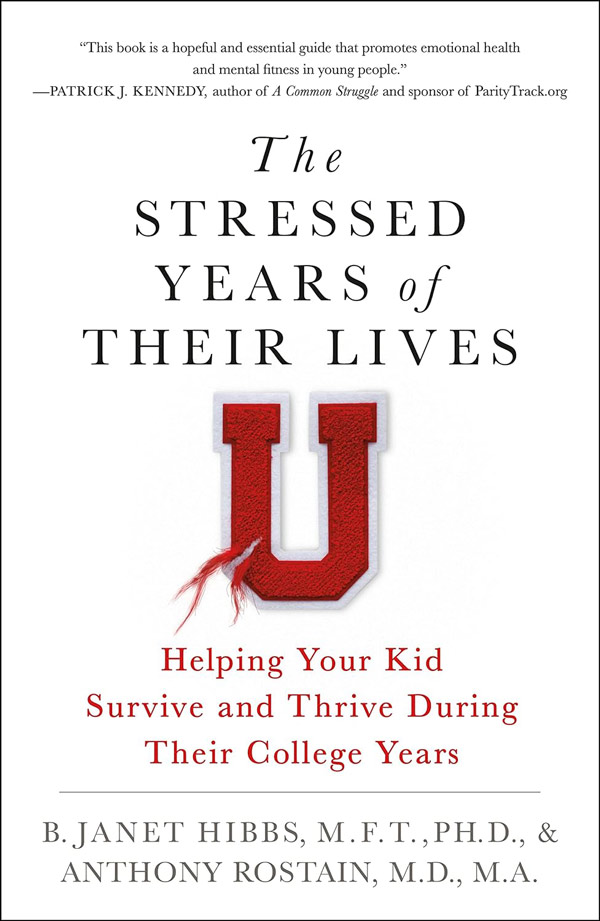The Stressed Years of Their Lives: Helping Your Kid Survive and Thrive During Their College Years
A review of the book by Janet Hibbs, PhD, MFT and Anthony Rostain, MD, MA
A depressed young adult named Nick lives at home with his parents, playing video games all night and rarely venturing outside of the house. He doesn’t have a job or go to school. When he does go out, he becomes enraged when another driver cuts him off in traffic or feels humiliated when he has an awkward social interaction.
Nick doesn’t see his high school friends anymore because it’s too painful for him. “Everybody else has a life.” They’re attending college or working to support themselves. Nick feels like a drag on everyone – “a total waste of space.” His computer has become his best friend; it’s all he interacts with anymore.
Nick’s story is one of the illuminating case vignettes recounted in Janet Hibbs’ and Anthony Rostain’s book The Stressed Years of Their Lives: Helping Your Kid Survive and Thrive During Their College Years (St. Martin’s Press, 2019). The book lives up to the promise of its subtitle. It is a practical, compassionate, comprehensive guide for parents to help them prepare and support their children through the challenges of emerging adulthood.
While the book focuses on college, it is relevant for all families with teens or young adults in this transitional phase of life, particularly those who may struggle with issues of social acceptance, dependency, mental health, or substance use.
The Stressed Years of Their Lives is the product of a unique and especially poignant collaboration. Janet Hibbs, PhD, MFT, is a family psychologist whose son Jensen returned from college in a dangerously depressed state. In their moment of crisis, the family turned to Anthony Rostain, MD, a nationally recognized expert in child and adolescent psychiatry, and Janet’s future co-author.
In the book, they describe Jensen’s and their journey through crisis and recognition, diagnosis and treatment, setbacks, gains, and recovery. They also weave several other stories of young adults like Nick throughout the text.
The Stressed Years of Their Lives cites an abundance of data to document the growing problem of emerging adults leaving home increasingly unprepared for the independence and demands of college life. It addresses the mental health and life skill challenges facing college-age youth today, and the treatments, supports and parenting approaches for dealing with them. The case vignettes, two or three per chapter, bring it all home, giving a human face to the wealth of practical information covered in the text.
Nick’s story is a perfect illustration of the problem of Failure to Launch (FTL) in young adults. An entire chapter of the book, “From Recovery to Relaunch,” is devoted to this subject. In an article I wrote for this blog in 2017, I define FTL as “a non-judgmental way to describe the frustration and concern parents and other family members feel when a young person seems unable to move forward and achieve significant milestones of life expected for someone that age.”
I first heard about FTL from Dr. Ely Lebowitz, the Director of the Program for Anxiety Disorders at the Yale Child Study Center. He prefers the term “faltering launch,” to describe this problem. The authors of The Stressed Years of Their Lives observe many of the same traits in these youth: “college drop-out, work avoidance, need for financial support, computer/Internet addiction, and a day-for-night sleep inversion.”
These traits are consistent with the reports of users of this website, mainly parents, who contact us for help. Seventy-three percent of the 2,000 cases a year handled by our Resource Specialists involve FTL or related problems with a young adult.
One thing we have learned from these calls is how overwhelmed parents and other family members feel. The young person with FTL is not the only one who suffers. Usually, the entire family feels the effects. How family members respond to an FTL situation and the ways in which they provide support and set expectations for a young adult living at home, can have a bigger impact on the problem than many parents realize. This is a point that also comes out in The Stressed Years of Their Lives.
The book also covers topics such as substance use and risk of suicide, as well more general topics such as fostering independence and encouraging the development of age-appropriate life skills and improved executive functioning in emerging adults. Most of the book is proactive and preventative in its approach. It is relevant for all families with young adults headed off to college, not just those with mental health concerns.
Parents who read this book while their teens are still in high school are more likely to avoid an FTL situation in emerging adulthood. They will not only learn to identify signs for concern in their older teens heading off to or already in college. They will also receive practical advice on how to handle difficult situations with their young adult and to recognize when a professional response is called for, including the types of treatment and interventions that are mostly likely to be effective.
Beginning in the 1990s, colleges across the United States noticed a sudden rise in student mental health problems. Since then, the problem has only gotten worse. The Stressed Years of Their Lives is the most comprehensive, authoritative book on this subject to date.
Dr. Hibbs’ experience as a parent who has lived through the stress and worry of parenting a college student with serious mental health concerns adds an insider’s perspective that is missing from other accounts. Too often, the parents of young people who falter in their transition to adulthood are blamed for coddling and over-protective interference in their lives. What these families really need is good information, support and guidance, and knowledge about the resources that exist for their young adults who struggle.
The Stressed Years of Their Lives: Helping Your Kid Survive and Thrive During Their College Years is a hope-filled account of what it takes to support a kid through these challenging years of transition and is an invaluable resource for all families.
ABOUT THE AUTHORS
B. JANET HIBBS M.F.T., Ph.D. has held faculty positions for more than 15 years in graduate programs for psychologists and marital and family therapists, and maintains a private practice in Philadelphia.
ANTHONY ROSTAIN, M.D., M.A., is a nationally recognized expert in the field of child and adolescent psychiatry. He is professor of psychiatry and pediatrics at the Perelman School of Medicine, University of Pennsylvania, and practices “lifespan neurodevelopmental psychiatry” at The Children’s Hospital of Philadelphia (CHOP) and in the Department of Psychiatry of Penn Medicine. He was Co-Chair of the University of Pennsylvania’s Task Force on Student Psychological Health and Welfare from 2014-2016.
Want to read The Stressed Years of Their Lives: Helping Your Kid Survive and Thrive During Their College Years? Check out the link above!
Your purchases will help support the costs of running www.rtor.org, a free service of Laurel House, Inc., 501 (C)(3), non-profit organization.
Laurel House, Inc., the sponsor of rtor.org, is a participant in the Amazon Services LLC Associates Program, an affiliate advertising program designed to provide a means for sites to earn advertising fees by advertising and linking to Amazon.com. Some links may be affiliate links. We may get paid if you buy something or take an action after clicking one of these.
Photo by Photo By: Kaboompics.com: https://www.pexels.com/photo/close-up-shot-of-a-boy-thinking-6958567/
Recommended for You
- Silver Hill Hospital: My Family’s 35-Year History with a National Leader in Quality Mental Health Care - February 7, 2023
- Connecticut Mother Who Lost a Son to Overdose Shares Her Story and Hosts Wilton Fundraiser to Benefit Laurel House - November 9, 2022
- Laurel House Offers $10,000 Racial Equity Scholarship for a Black or Hispanic Student Pursuing a Master’s of Social Work Degree - June 8, 2022






